Related Research Articles

The Sinhalese people, also known as the Sinhalese are an Indo-Aryan ethno-linguistic group native to the island of Sri Lanka. Historically, they were also known as the Helas or the Lion People. They are the largest ethnic group in Sri Lanka, constituting about 75% of the Sri Lankan population and number more than 15.2 million.
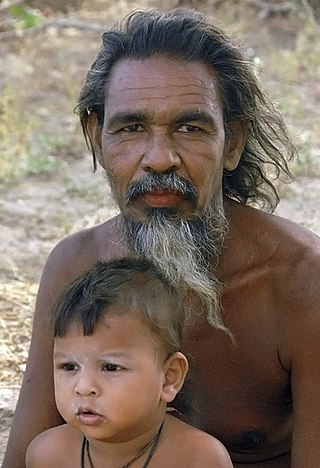
The Vedda, or Wanniyalaeto, are a minority indigenous group of people in Sri Lanka who, among other sub-communities such as Coast Veddas, Anuradhapura Veddas and Bintenne Veddas, are accorded indigenous status. The Vedda minority in Sri Lanka may become completely assimilated. Most speak Sinhala instead of their indigenous languages, which are nearing extinction. It has been hypothesized that the Vedda were probably the earliest inhabitants of Sri Lanka and have lived on the island since before the arrival of other ethnic groups in India.
The "Sri Lanka Matha" is the national anthem of Sri Lanka. "Sri Lanka Matha" was composed by Ananda Samarakoon and was originally titled "Namo Namo Matha".
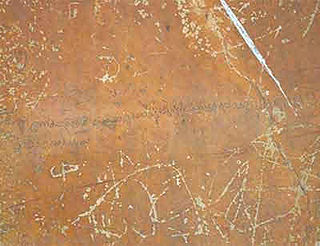
Sinhala, sometimes called Sinhalese, is an Indo-Aryan language primarily spoken by the Sinhalese people of Sri Lanka, who make up the largest ethnic group on the island, numbering about 16 million. Sinhala is also spoken as the first language by other ethnic groups in Sri Lanka, totalling about 2 million speakers as of 2001. It is written using the Sinhala script, which is a Brahmic script closely related to the Grantha script of South India.

Mahāvaṃsa is the meticulously kept historical chronicle of Sri Lanka until the period of Mahasena of Anuradhapura. It was written in the style of an epic poem written in the Pali language. It relates the history of Sri Lanka from its legendary beginnings up to the reign of Mahasena of Anuradhapura covering the period between the arrival of Prince Vijaya from India in 543 BCE to his reign and later updated by different writers. It was first composed by a Buddhist monk named Mahanama at the Mahavihara temple in Anuradhapura in the 5th or 6th-century CE.

Theravada Buddhism is the largest and official religion of Sri Lanka, practiced by 70.2% of the population as of 2012. Practitioners of Sri Lankan Buddhism can be found amongst the majority Sinhalese population as well as among the minority ethnic groups. Sri Lankan Buddhists share many similarities with Southeast Asian Buddhists, specifically Myanmar Buddhists and Thai Buddhists due to traditional and cultural exchange. Sri Lanka is one of five nations with a Theravada Buddhist majority.
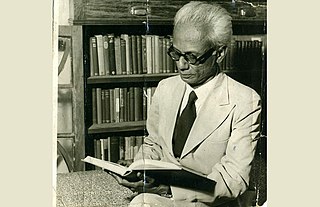
Lama Hewage Don Martin Wickramasinghe, was a Sri Lankan journalist and author. His books have been translated into several different languages. Martin Wickramasinghe is often acclaimed as the father of modern Sinhala literature.
Sri Lankan English (SLE) is the English language as it is used in Sri Lanka, a term dating from 1972. Sri Lankan English is principally categorised as the Standard Variety and the Nonstandard Variety, which is called as "Not Pot English". The classification of SLE as a separate dialect of English is controversial. English in Sri Lanka is spoken by approximately 23.8% of the population (2012 est.), and widely used for official and commercial purposes. Sri Lankan English being the native language of approximately 5,400 people thus challenges Braj Kachru's placement of it in the Outer Circle. Furthermore, it is taught as a compulsory second language in local schools from grade one to thirteen, and Sri Lankans pay special attention on learning English both as children and adults. It is considered even today that access and exposure to English from one's childhood in Sri Lanka is to be born with a silver spoon in one's mouth.
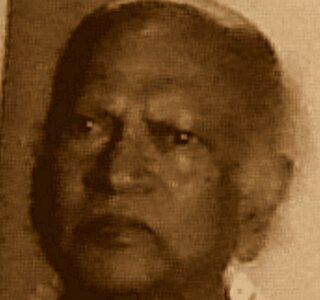
Siri Gunasinghe was a Sri Lankan academic, poet, Sanskritist, art historian, author and filmmaker. He played a crucial role in honing the creativity of free Sinhala poetry. Gunasinghe was one of the most important advocates of the use of spoken language instead of the literary language in Sinhalese literature.
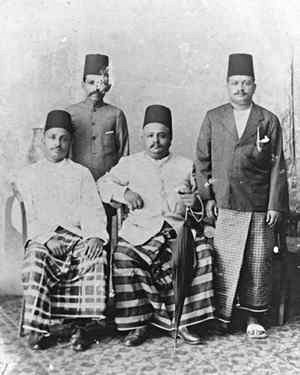
Sri Lankan Moors are an ethnic minority group in Sri Lanka, comprising 9.3% of the country's total population. Most of them are native speakers of the Tamil language. The majority of Moors who are not native to the North and East also speak Sinhalese as a second language. They are predominantly followers of Islam. The Sri Lankan Muslim community is mostly divided between Sri Lankan Moors, Indian Moors, Sri Lankan Malays and Sri Lankan Bohras. These groups are differentiated by lineage, language, history, culture and traditions. Finlay McDonald has noted in the second paragraph of his article on Sri Lankan Muslims in New Zealand's conversation newspaper, published on April 23, 2019, the following observation, "Linguistically, most have Tamil as their mother tongue, often leading them to be categorised as part of the island’s Tamil minority, alongside Hindus and Christians. There are, however,Muslims who speak the majority Sinhala language."
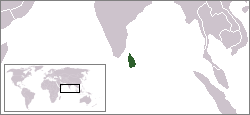
The 1958 anti-Tamil pogrom and riots in Ceylon, also known as the 58 riots, refer to the first island-wide ethnic riots and pogrom to target the minority Tamils in the Dominion of Ceylon after it became an independent dominion from Britain in 1948. The riots lasted from 22 May until 29 May 1958 although sporadic disturbances happened even after the declaration of emergency on 27 May 1958. The estimates of the murders range, based on recovered bodies, from 158 to 1,500. Although most of the victims were Tamils, Sinhalese and their property were also affected by retaliatory attacks by Tamil mobs throughout the Batticaloa and Jaffna districts. As the first full-scale race riot in the country in over forty years, the events of 1958 shattered the trust the communities had in one another and led to further polarisation.
The origins of the Sri Lankan Civil War lie in the continuous political rancor between the majority Sinhalese and the minority Sri Lankan Tamils. According to Jonathan Spencer, a social anthropologist from the School of Social and Political Studies of the University of Edinburgh, the war is an outcome of how modern ethnic identities have been made and re-made since the colonial period, with the political struggle between minority Tamils and the Sinhalese-dominant government accompanied by rhetorical wars over archeological sites and place name etymologies, and the political use of the national past.

The main languages spoken in Sri Lanka are Tamil and Sinhala. Several languages are spoken in Sri Lanka within the Indo-Aryan, Austronesian, and Dravidian families. Sri Lanka accords official status to Sinhala and Tamil, with English as a recognised language. The languages spoken on the island nation are deeply influenced by the various languages in India, Europe and Southeast Asia. Arab settlers and the colonial powers of Portugal, the Netherlands and Britain have also influenced the development of modern languages in Sri Lanka. See below for the most-spoken languages of Sri Lanka.
Vedda is an endangered language that is used by the indigenous Vedda people of Sri Lanka. Additionally, communities such as Coast Veddas and Anuradhapura Veddas who do not strictly identify as Veddas also use words from the Vedda language in part for communication during hunting and/or for religious chants, throughout the island.
Sinhalese Buddhist nationalism is a Sri Lankan political ideology which combines a focus upon Sinhalese culture and ethnicity (nationalism) with an emphasis upon Theravada Buddhism, which is the majority belief system of most of the Sinhalese in Sri Lanka. It mostly revived in reaction to the colonisation of Sri Lanka by the British Empire and became increasingly assertive in the years following the independence of the country.

Wijesinghe Jayaweera Mudiyanselage Lokubandara, was a Sri Lankan politician who was Speaker of the Parliament of Sri Lanka from 2004 to 2010 and Governor of Sabaragamuwa Province from 2010 to 2015. He was a lawyer by profession, and wrote books, poems, and songs. He held several ministries in the government of Sri Lanka before his appointment as Speaker of the House.

Kumaratunga Munidasa was a pioneer Sri Lankan (Sinhalese) linguist, grammarian, commentator, and writer. He founded the Hela Havula movement, which sought to remove Sanskrit influences from the Sinhala language. Considered one of Sri Lanka's most historically significant scholars, he is remembered for his profound knowledge of the Sinhala language and its literary works.
Kala Keerthi Wijetunga Karunaratne Edwin Ariyadasa, popularly known as Edwin Ariyadasa, was a Sri Lankan Sinhalese journalist. He was a well known newspaper editor, author and a media consultant. Considered as an icon in Sri Lankan media, he was a pioneer in bilingual communication and wrote about Sinhala cinema in English in Sri Lanka. He was also the pioneer teacher who brought the subject of communication closer to general public.

Bodu Bala Sena, also abbreviated as BBS is a far-right anti-liberalist, and ultranationalist Sinhalese Buddhist organization, and a break-away faction from the right-wing nationalist Jathika Hela Urumaya party. The BBS generally opposes pluralist and democratic ideologies, and criticizes non-extremist Buddhist monks for not taking action against the rise of other religions within Sri Lanka.

Madura English–Sinhala Dictionary is a free electronic dictionary service developed by Madura Kulatunga. It is available as computer software, an online website and an android app. The dictionary contains over 230,000 definitions including various technical terms. As of 2016, the dictionary has been downloaded approximately 1,000,000 and ranks 100th most visited sites in Sri Lanka. The dictionary is distributed as freeware. It was initially released on 23 November 2002.
References
- ↑ "In the footsteps of Gurulugomi..." The Island. Retrieved 11 June 2015.
- 1 2 3 "How Sinhala literature developed". The Sunday Times. Retrieved 11 June 2015.
- ↑ Sucharitha Gamlath (21 March 2010). "Who killed Sinhala literature and language?". Sunday Observer (Interview). Interviewed by Ranga Chandrarathne. Archived from the original on 2016-03-04. Retrieved 16 June 2015.
- ↑ The Greeks and the Mauryas book by Senarat Paranavitana